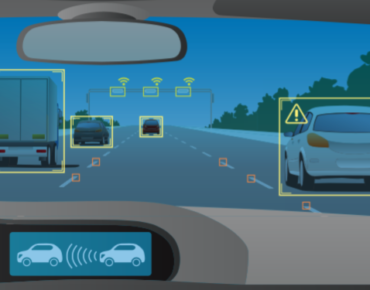Intel Buys Car Computer Vision Specialist Mobileye

(chombosan/Shutterstock)
Intel Corp. continued its foray into the autonomous vehicle sector this week with the acquisition of computer vision and machine-learning specialist Mobileye for about $15 billion in cash.
Betting that autonomous vehicles are emerging as "data centers on wheels," the chipmaker (NASDAQ: INTC) said Monday (March 13) the acquisition that also includes data analytics as well as mapping and "localization" technologies would advance its position in the booming vehicles systems and data services markets. "This transaction extends Intel’s strategy to invest in data-intensive market opportunities that build on the company’s strengths in computing and connectivity from the cloud, through the network, to the device," Intel noted in a statement announcing the deal.
The deal for Mobileye N.V. (NYSE: MBLY) follows Intel's announcement in January that it would acquire a 15 percent stake in digital map and location services specialist HERE.
Along with connectivity, computer vision and machine learning, the companies also will combine sensor fusion and high-performance computing capabilities for mapping and location services. Intel said it expects to leverage Mobileye's auto computer vision capabilities and ties to the auto industry to advance "cloud-to-car" platforms.
Intel estimates that autonomous vehicles will generate an about 4,000 GB per day by 2020. The vehicle systems, data services market is forecast to grow to about $70 billion by 2030, the company asserts.
The combined autonomous driving unit would be based in Israel and led by Amnon Shashua, Mobileye's co-founder and CTO. Doug Davis, general manager of Intel's Automated Driving Group, will oversee the combined organization and report to Shashua.
Mobileye is providing its EyeQ5 vision processor to an Intel-BMW Group initiative to develop an autonomous car. The processor will be used to interpret input from sensors and serve as part of the central computing platform along with Intel CPUs and FPGAs for the proposed BMW iNEXT vehicle.
The chipmaker's steady move into the autonomous vehicle markets comes as it faces heightened competition in the datacenter where its x86 server chips have long dominated. Last week, Microsoft (NASDAQ: MSFT) announced it would collaborate with Cavium Inc. and Qualcomm Inc. (NASDAQ: QCOM) on ARM-based server processors running Azure cloud workloads.
Intel expects its all-cash acquisition of Mobileye to be completed within the next nine months.
Related
George Leopold has written about science and technology for more than 30 years, focusing on electronics and aerospace technology. He previously served as executive editor of Electronic Engineering Times. Leopold is the author of "Calculated Risk: The Supersonic Life and Times of Gus Grissom" (Purdue University Press, 2016).










